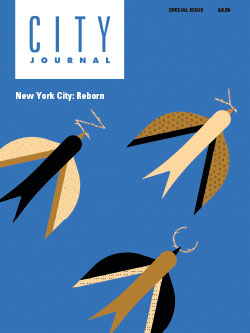The Covid-19 pandemic and the restrictions imposed to suppress the virus have left New York reeling, with shuttered restaurants, eerily empty offices, and boarded-up storefronts and darkened entertainment venues—a crisis intensified by last summer’s riots and a frightening rise in violent crime that evokes bad memories of early 1990s Gotham. As part of the Manhattan Institute’s “New York City: Reborn” project, aimed at helping New York achieve a brighter future, City Journal commissioned a series of essays that have run online throughout the second half of 2020 and into this year. This special issue compiles and updates that work. With a mayoral election this fall to replace Bill de Blasio, the time for bold leadership is now, and this collection can be a guidebook for a post-pandemic city.
Essential to New York’s future is getting crime back under control, as nothing was more crucial to the city’s revitalization over the past quarter-century than its public-safety gains, delivered by effective, data-driven policing. Heather Mac Donald’s “A New Crime Wave—and What to Do About It” gives the grim 2020 numbers: through late December, murders were up 41 percent over 2019 and shootings 103 percent. The reason for the mayhem is inescapable, argues Mac Donald: the obsession among progressive city officials with “antiracism.” That obsession has led them to curb the New York Police Department’s enforcement of quality-of-life infractions as hostile to minorities and encouraged decarceration initiatives, detailed by Rafael A. Mangual in “New York’s Department of Overcorrection,” which are putting wrongdoers back on the streets, shortly after cops have arrested them. Mac Donald and Mangual call for sanity to be restored before it is too late.
New York’s pandemic-ravaged budget is another crisis point, explains Steven Malanga in “The Bill Comes Due.” Mayor de Blasio’s overspending over the last eight years means that his successor must make tough decisions if the city is to reach stable fiscal ground. With nosebleed taxes already driving well-off residents from the city, budget cuts are unavoidable. Malanga lays out achievable compensation reforms, similar to those that will be required to keep public transit from imploding, as Nicole Gelinas shows.
The issue covers various aspects of the city’s economy. Looming over it all is “The Big Retrofit” of office space for a post-Covid-19 world, as James B. Meigs explains in fascinating detail. New York’s tech sector was one 2020 bright spot, but as Danny Crichton contends in “Keep New York Tech Strong,” the next mayor should take nothing for granted. The innovative workers who drive the tech economy want urban amenities and services, quality of life, and reasonable housing costs; New York will need to compete in these areas if it wants them to stick around. Essays from Eric Kober and Nolan Gray show how the city’s housing supply can be expanded through zoning and regulatory changes, providing more affordable options for newcomers.
If New York is to thrive, it also must be a place where families can educate their kids—and that means that its schools need to be far better. Ray Domanico’s “Saving Gotham’s Students” assesses the de Blasio education record and gives it a failing grade. The mayor’s emphasis on inequities and the downplaying of quality and merit have been misguided, all the more so during the pandemic, as remote learning has been a disaster, especially for disadvantaged students. The next mayor must embrace an educational pluralism that gives parents real choices, Domanico says. The City University of New York, long an engine of upward mobility, is key to New York’s outlook, maintains Daniel DiSalvo, but like the city as a whole, it will need to get its finances in order.
There’s much more, including Stephen Eide on New York’s worsening homelessness problem, Naomi Schaefer Riley on making the city’s foster care system safer, and Arpit Gupta on improving trash collection, a major quality-of-life issue. Whether the political will exists for needed reforms is another question, as Seth Barron’s “Can New York Find a Better Leader?” underscores. The next mayor has an opportunity to set New York’s path for the decade ahead. Let’s hope that he or she seizes it.
—Brian C. Anderson
